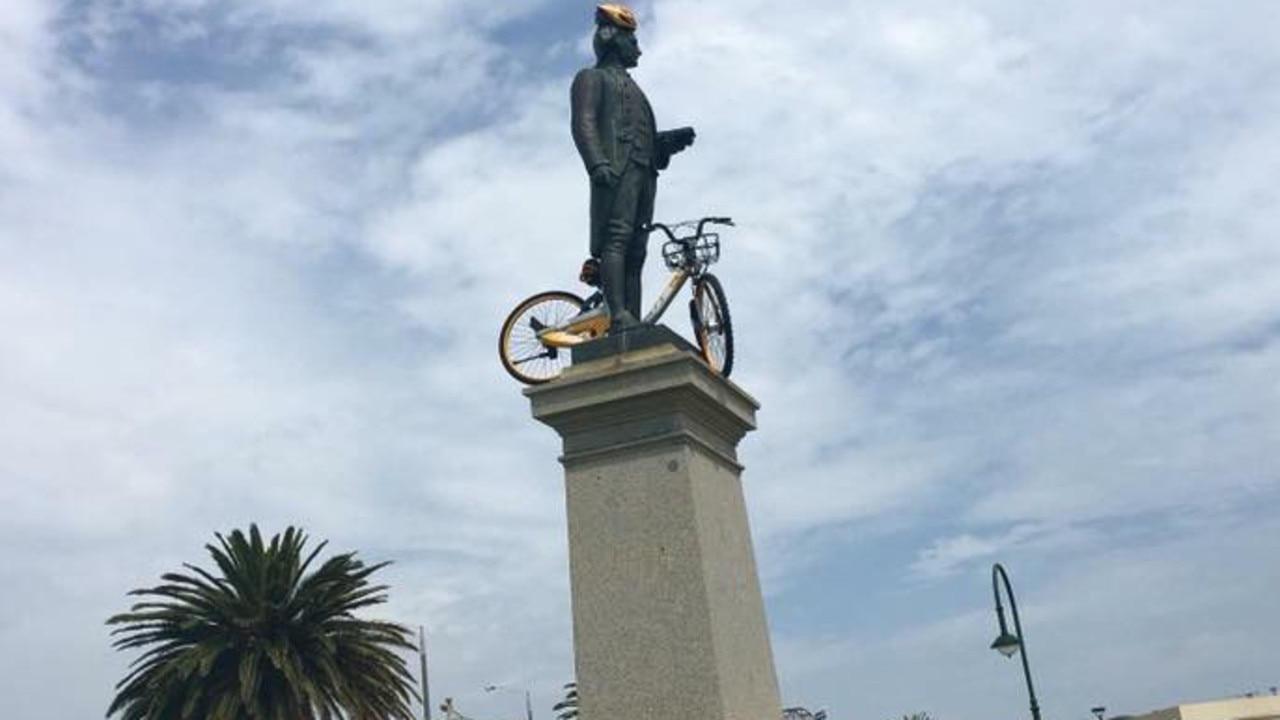Bike share companies Ofo, oBike and Reddy Go set to depart Australian shores
IT’S the bike share scheme many of us loved to hate. But now, it’s set to back-pedal out of the Australian market — for good.
FOR months, Aussies have complained of dumped share bikes littering the streets — and now, it seems the dockless bike experiment has failed spectacularly.
Chinese-owned Ofo has just announced it will be withdrawing from Australia within two months, following hot on the heels of several other big-name competitors.
The stunning turnaround comes less than a year after the Ofo scheme was first rolled out in Adelaide in October 2017, followed by Sydney soon after.
• Your biggest fear set to disappear
• ‘None of mother-in-law’s business’
• Woolies warns of 60 per cent price hike
In a statement released to news.com.au today, the company confirmed it now had made a “strategic decision to focus on priority markets internationally”.
“Ofo will therefore wind-down operations in Adelaide and Sydney during the next 60 days,” the statement reads.
“As part of this process, Ofo will begin to remove bikes from cities and consolidate them to our warehouses.
“This decision does not come lightly, and Ofo Australia will act responsibly in each market as it winds down operations, resolving any outstanding concerns before finalising operations.”
But Ofo is just the latest bike share operator to leave Australian shores.
Singaporean company oBike launched in Australia a few months before Ofo did last year, but last month it revealed it would leave the Melbourne market. It’s parent company has also gone into liquidation.
And this week, Australian-owned Reddy Go also revealed it would likely be departing from Sydney, with The Australian revealing the company was undergoing a restructure and that as a result, customers could pick up two free bikes from its storage facility in Alexandria in the inner city.

While these sorts of schemes were originally touted as a democratic, cheap and environmentally friendly transport solution, it didn’t take long for backlash to grow, once members of the public began to regularly dump the bikes in rivers, on roads, in piles on street corners and even in tree branches.
Last September, 42 oBikes were fished out of the Yarra in Melbourne and the Facebook group OBikes in unusual places quickly sprung up, with members sharing pictures of the bicycles in odd places such as hanging from basketball hoops and sitting on top of scaffolding.
The problem was so significant, Melbourne Mayor Robert Doyle weighed in on the debate, telling companies they needed to clean up the streets — or leave the city altogether.
And in NSW, Minister for Transport Andrew Constance also took aim at the bikes, telling 2GB in February they were “disgusting” and comparing them to “dumped shopping trolleys everywhere”.
“We’ve got to get them docked, we’ve got to get them cleaned up because it’s repulsive the way they’re being dumped everywhere,” he said.
Industry information research company, IBISWorld, said while bike share companies are popular in Europe and China, they have failed in Australia thanks to local laws, vandalism, complaints about misplaced bikes, and data collection concerns.

But IBISWorld senior industry analyst Kim Do said there were two particular reasons why the companies have struggled in the Australian market.
“The first is balancing supply and demand. An oversupply of bikes is a key reason why dockless bike sharing services are failing in Australia,” Ms Do said.
“An abundance of bike sharing start-ups have entered the Australian market over the past year, all fighting for market share.
“However, the number of users has failed to grow in line with supply, leading to a glut of share bikes.”

And according to Ms Do, the companies hadn’t been able to convince customers to park their bikes properly after use, leading to a deluge of vandalism and dumping.
“As Australian government authorities began to crack down on dumping, imposing fines of up to $3000, Australia was no longer a viable market for these players,” she said.
The withdrawal of the companies has met with a mixed reaction from consumers, with some welcoming the news while others condemned fellow Aussies for breaking the rules and causing the serious dumping problems in the first place.
Gees, no more bikes in trees, on roofs, in rivers. What will become of my life @peter124u
— constitutionwalk (@The1770Impact) July 10, 2018
It was only a matter of time. Sad to hear that @ofo_bicycle is pulling out of Sydney. I've used these bikes many times and they've been perfect but over time finding them has been harder as they've ended up in creeks or piles like this. #ofo #sad #society #norespect #bikeshare https://t.co/z3UM6XCxxm
— Rebecca Cooper (@bec_coops_) July 9, 2018



